In the realm of ‘Vietnam travel safety,’ welcome to this captivating world of Vietnam. This is a country renowned for its natural beauty, steeped in a rich historical legacy, and vibrant in cultural diversity. As you embark on your exploration of this captivating destination, we’ll not only unveil the alluring aspects of Vietnam’s culture, history, and landscapes but also provide invaluable insights into ensuring your ‘Vietnam travel safety’ for a memorable and secure adventure.
See more: Explore the Best of Vietnam with Your Ultimate Travel Guide
Contents
Essential Health Precautions for Vietnam Travel Safety
As you embark on your Vietnam adventure, your well-being takes center stage. Understanding essential health precautions is your first step towards a secure journey.
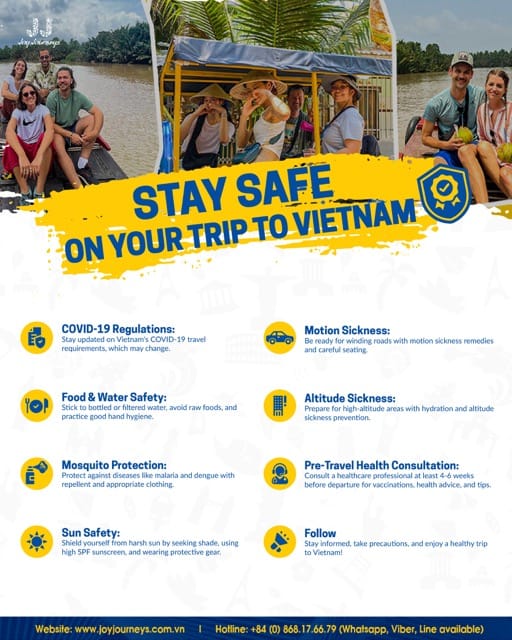
Vaccines for Travel to Vietnam
While there may not be mandatory passport vaccines, it’s still highly advisable to consider the recommended vaccines to protect your health and ensure a safe and enjoyable travel experience in Vietnam.
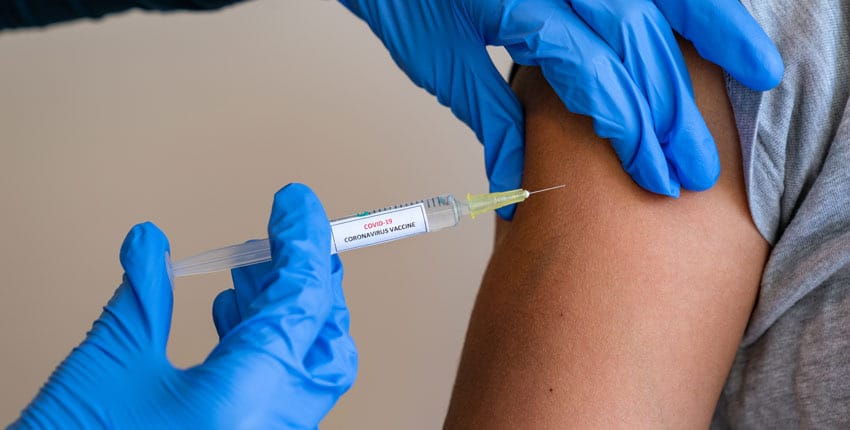
- Routine Vaccinations:
- Measles, mumps, rubella (MMR)
- Diphtheria, tetanus, and pertussis (DTaP)
- Varicella (chickenpox)
- Polio
- Hepatitis A: This vaccine is recommended for all travelers to Vietnam because of the risk of consuming contaminated food and water.
- Typhoid: Typhoid can be contracted through contaminated food and water in Vietnam, so a typhoid vaccine is advisable.
- Hepatitis B: If you might have intimate contact with local residents or anticipate receiving medical treatment in Vietnam, a hepatitis B vaccine may be recommended.
- Japanese Encephalitis: This vaccine is recommended if you plan to spend a significant amount of time in rural or agricultural areas, as these are higher-risk areas for Japanese encephalitis.
- Rabies: If you anticipate contact with animals or participating in outdoor activities that may increase the risk of animal bites, a rabies vaccine might be considered.
- Cholera: Cholera vaccination might be recommended for certain travelers depending on their specific circumstances.
- Malaria Prophylaxis: In some regions of Vietnam, malaria is a concern. Travelers may need to take malaria prophylaxis medications, so consult a healthcare provider for advice.
Remember that the vaccine recommendations can vary depending on the region of Vietnam you plan to visit, the activities you’ll engage in, your overall health, and any changes in the local health situation. Therefore, it’s crucial to seek advice from a healthcare professional or a travel clinic who can provide personalized recommendations based on your specific travel plans and health history.
Check out reputable sources here
Amid Local Health Risks
In addition, water and food-borne infections are among Vietnam’s most prevalent health concerns. To avoid getting sick, it’s important to only consume bottled or boiled water and to exercise caution when eating street food. Make sure to only eat thoroughly cooked, hot food.
Mosquito-borne diseases like malaria and dengue fever are also common in Vietnam. To protect yourself, wear long sleeves and pants, use mosquito nets while sleeping, and apply insect repellent that contains DEET. It’s also crucial to stay away from wet areas because they serve as mosquito breeding grounds.
Travelers should take precautions to lessen mosquito breeding areas, wearing protective clothes, utilizing mosquito nets, and applying insect repellent. This entails avoiding standing water around your accommodations, using screened windows and doors, and staying indoors at the height of mosquito activity.
Exploring a vibrant culinary adventure with Vietnamese cuisine.
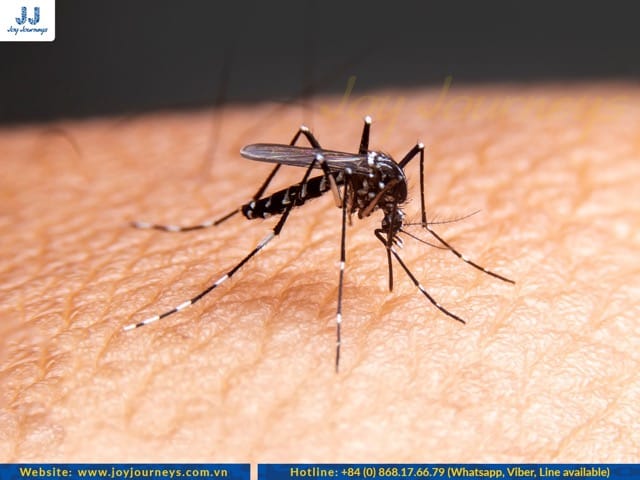
Safety Precautions
Beware of common scams
It’s critical to practice safety measures when visiting Vietnam to guard against frequent scams, pickpocketing, and other potential dangers.
Some of the most significant safety measures to remember are listed below:
- Overcharging for goods and services.
- Faking taxi drivers.
- Pickpocketing.
- Assault on tourists in Vietnam.
It’s critical to be aware of these frauds and refrain from handing over cash or personal information to strangers to protect yourself.
Being watchful and aware of your surroundings is essential to avoid being a victim of pickpocketing in Vietnam. Here are some recommendations for avoiding pickpocketing:
Your wallet, phone, and other valuables should be kept securely, such as in a zippered bag or a front pocket. Avoid wearing pricey jewelry or carrying a lot of cash.
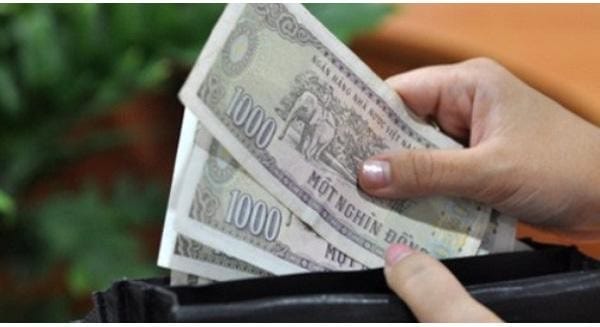
Be on the lookout for unusual activity and remain vigilant in crowded situations. Avoid going for a solo stroll at night, especially in remote regions.
Travelers should be wary of accepting assistance from strangers and refrain from flaunting their valuables in public.
Never, not even for a few whiles, leave your possessions unattended.
To keep your stuff safe, try employing anti-theft equipment, such as money belts or slash-proof bags.
It’s important to report the robbery to law enforcement and cancel any stolen credit cards or other forms of identification if you become a pickpocketing victim.
Travelers can contribute to ensuring a risk-free and pleasurable journey to Vietnam by adopting some safety measures and being aware of potential risks.
Get ready to imersing yourself in Vietnam festivals.
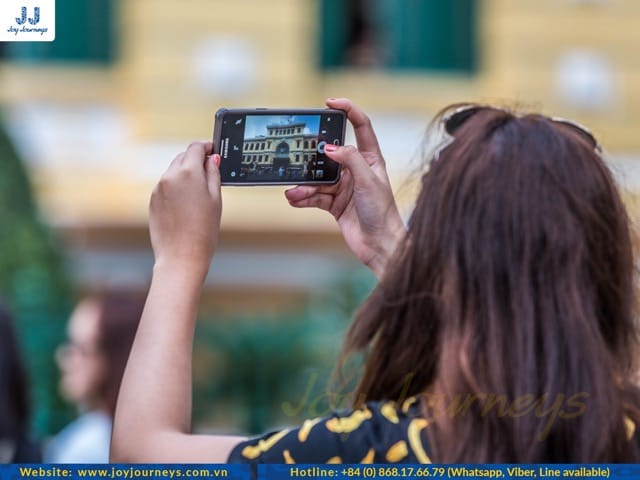
Use reputable taxis brands only
When taking a taxi in Vietnam, tourists should exercise caution, especially if unfamiliar with the area or the local language.
Using reputable taxis from recognized companies like Vinasun or Mai Linh taxi is essential to protect your safety and avoid scams or fraudulent activities.
These firms have a track record of offering clients dependable and secure services.
In order to avoid surprises, if you want to utilize a ride-hailing service like Grab, be sure to confirm with the driver that the meter has been started and to agree on the fare in advance.
In case of communication issues, having your destination’s address written down or saved on your phone is also a good idea.
Following these easy steps, you may travel around Vietnam without fear or concern.
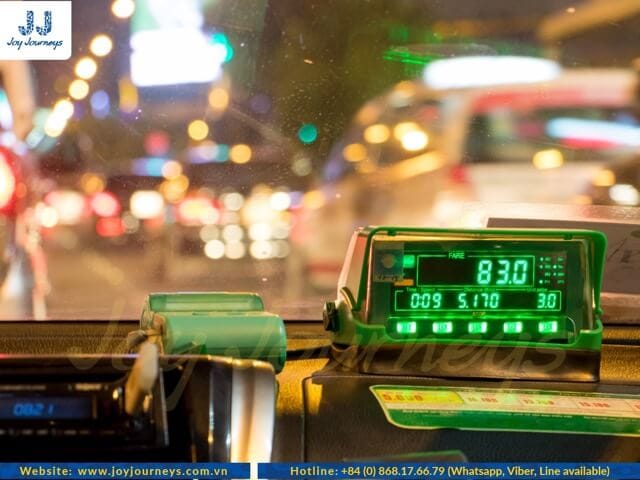
Police in Vietnam
When traveling to Vietnam, it’s essential to be aware of the role of the police and how to contact them in case of emergencies. The police in Vietnam play a crucial role in maintaining law and order, as well as assisting residents and tourists. Here’s some important information for travelers:
- Police Hotlines: In case of emergencies, you can reach out to the local police by dialing 113 (for police) or 114 (for fire) or 115 (for medical emergencies). These hotlines are toll-free and can be dialed from any phone within Vietnam.
- Tourist Police: While Vietnam does not have dedicated “Tourist Police” as seen in some other countries, the presence of local police stations and officers who can provide assistance to travelers is valuable information for tourists. In case of any issues or emergencies, travelers can seek assistance and report incidents at these police stations, making it easier to ensure their safety and security during their visit.
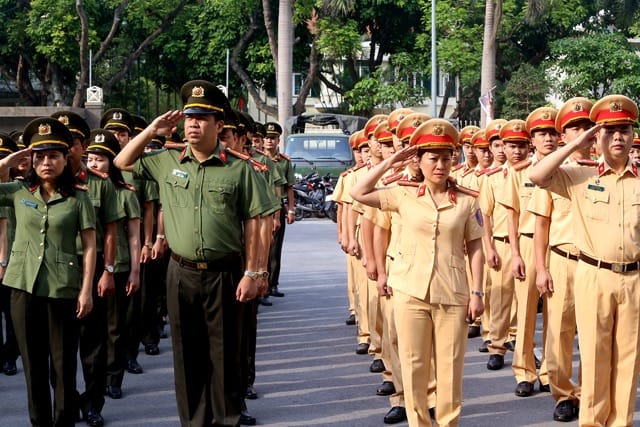
You Can Easily Recognize Vietnam Police By Their Uniform – Source: VNExpress - Role of the Police: The police in Vietnam are responsible for enforcing laws, ensuring public safety, and addressing various security concerns. They also provide assistance to residents and tourists alike. If you encounter any issues related to safety, theft, or other concerns during your stay, do not hesitate to contact the local police for help.
- Reporting Incidents: If you are a victim of a crime or if you witness any suspicious activity, it’s important to report it to the local police. They can help investigate and take necessary actions.
- Emergency Contact Information: Aside from the police, it’s also important to have the contact information for your country’s embassy or consulate in Vietnam. They can provide additional assistance and support in case of emergencies.
- Language Barrier: While some officers in tourist areas may speak English, it’s a good idea to have key phrases or requests translated into Vietnamese or to use a translation app in case of language barriers.
Safety Precautions for Solo Travel in Vietnam
Even though Vietnam is a generally safe country, it is advisable to exercise caution when traveling alone at night.
It’s crucial to put your safety first when traveling alone and to stay out of remote or dimly lit regions.
Instead, think about using a ride-hailing app or a taxi service to move around.
Doing this guarantees a hassle-free trip without being concerned about navigating new streets by yourself.
Always put your safety first when you travel, and by adopting these basic safety measures, you may travel to Vietnam without stress and enjoy yourself.
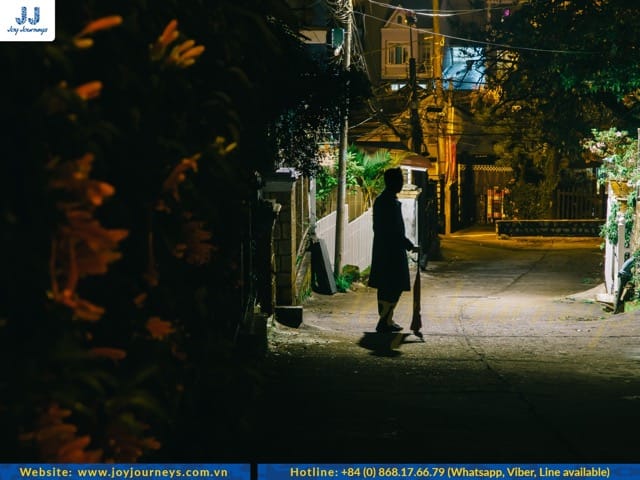
Keep your belongings secure
Pickpocketing is an issue in Vietnam, particularly in popular tourist places, so keep your possessions safe.
Keep your belongings close by and in a safe place, and avoid carrying a lot of cash or expensive stuff.
Transportation precautions
In Vietnam, many different forms of transport are available, including buses, taxis, motorcycles, and railroads.
The most popular form of transportation, particularly in cities, is the motorbike, which can be rented or hired by a driver.
In major cities, taxis and ride-hailing services are widely accessible and typically inexpensive.
Buses are a popular choice for longer distances that can be reserved at bus stations or through travel agencies.
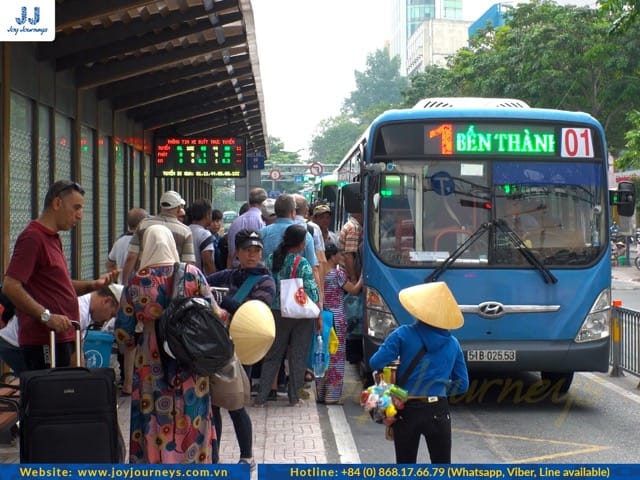
Travelers should take steps to ensure a safe and pleasurable stay because traffic in Vietnam can be chaotic.
Choosing reliable providers and avoiding unregistered or unmarked vehicles while using taxis or ride-hailing services is vital.
Look at the driver’s identity and record the license plate number.
When crossing the street in Vietnam, it’s important to remain cautious because the traffic might be chaotic. Cross only at official crossings, and make sure to look both ways.
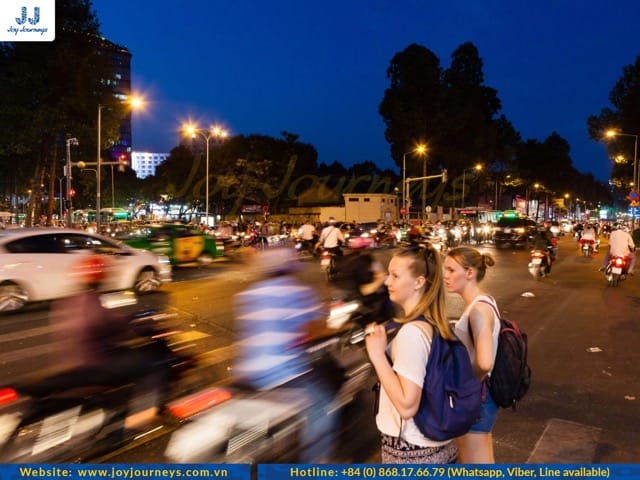
Although they might be risky, motorbikes are a common form of transportation in Vietnam.
- Always ride with licensed drivers and wear a helmet.
- Avoid using motorcycles that are unreliable or have excessive load.
- Always keep your stuff safe and in sight when utilizing public transit.
- Avoid leaving your bags or other belongings unattended, and keep them nearby.
Be mindful of your surroundings and be on the lookout for any unusual conduct when utilizing public transit.
Avoid using your phone or other electronics while moving through traffic or on foot.
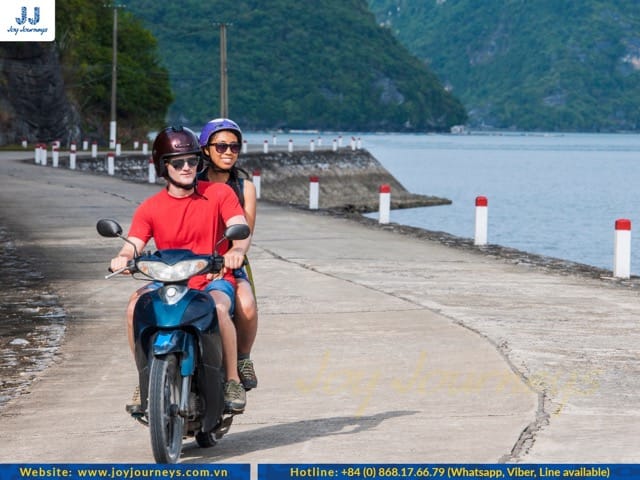
Cultural and Customs Regulations
Cultural Norms
To show respect and prevent accidental offense, it is crucial to be aware of local traditions and cultural norms before visiting Vietnam.
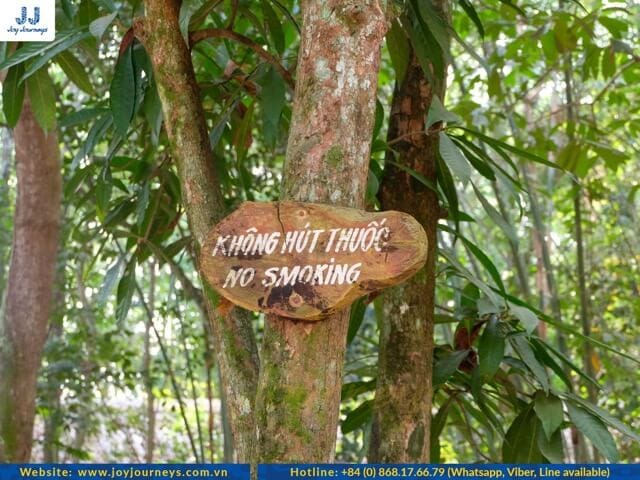
Be careful with public demonstrations of affection because they are uncommon in Vietnam and could be offensive.
Avoid kissing, embracing, or holding hands in front of others.
Due to Vietnam’s complicated and sensitive political background, it is best to avoid contentious subjects, including the war, communism, and the government.
Also, it’s critical to refrain from any actions that can be interpreted as disrespectful of the nation or its authorities.
When engaging with the locals, it’s important to be courteous and respectful, to use excellent manners such as saying “please” and “thank you,” and to refrain from acting rudely or aggressively.
Vietnam Customs Regulations
Travelers to Vietnam should also be aware of the laws and regulations of the country and steer clear of any potentially unlawful or prohibited actions.
For instance, using drugs is absolutely forbidden and is punishable by harsh measures like incarceration or even the death penalty.
It’s crucial to be informed of any political instability or social problems that may harm the country.
Do bear in mind that Vietnam has stringent rules against the ownership of weapons and that visitors from other countries are not permitted to travel with firearms or other weapons.
Both concealed and apparent firearms fall within this category.
These laws provide harsh consequences, such as deportation or imprisonment, for violations.
It’s also critical to remember that Vietnam has a complicated history, including a protracted war period. Some sites may still contain unexploded landmines and other harmful artifacts from the battle.
Travelers can help make for a happy and courteous experience when visiting Vietnam by following certain cultural precautions and being informed of local customs and conventions.
Don’t forget to discover the magic of Vietnam holiday.
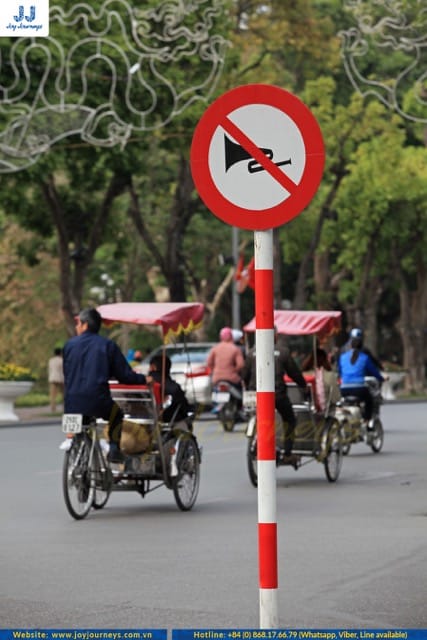
Environmental Precautions
Take environmental care to safeguard both yourself and the environment when visiting Vietnam.
Water Vietnam
- Tap Water vs. Bottled Water: In Vietnam, tap water is generally treated to meet local standards. However, it’s advisable to drink bottled water. Bottled water is widely available, affordable, and considered safe. It’s the most reliable option to keep you hydrated and ensure you’re not exposed to potential contaminants.
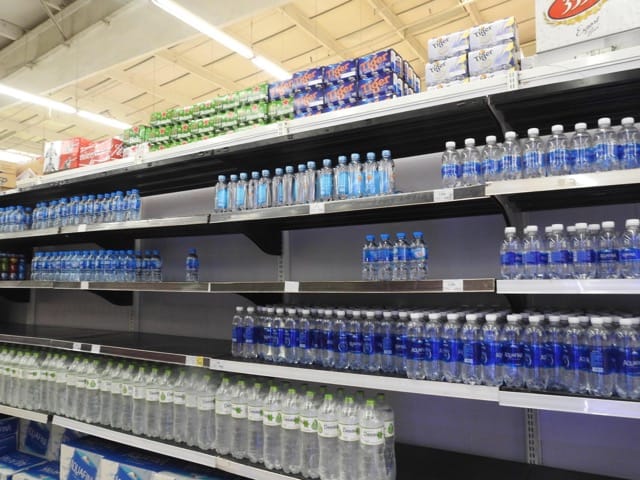
Bottled Water Is Cheap and Easy To Buy In Vietnam – Source: Internet
- Staying Hydrated: Staying hydrated in Vietnam’s tropical climate is essential. Carry a reusable water bottle and refill it with bottled water as needed. Avoid adding ice to your drinks in places where the source of the ice is unclear.
Moreover, swimming in places with pollution or other environmental dangers should be avoided.
Sharks in Vietnam
Although Vietnam has some stunning beaches, caution is necessary when swimming. While there are sharks in Vietnam’s waters, it’s important to note that sightings are rare, and the risk of shark encounters is generally low. However, for those who plan to explore the waters, here are some important considerations:
- Rare Sightings: Shark sightings along Vietnam’s coastline are infrequent. Most of the sharks in these waters are of species that are not considered aggressive to humans.

Sharks Are Rarely See In Vietnam – Source: VNExpress - Safety Precautions: While the risk of shark encounters is minimal, it’s still wise to exercise caution when swimming or engaging in water activities. It’s safer to know which areas are considered more shark-prone.
- Understanding Dangerous Areas: Sharks tend to be more prevalent in certain regions, particularly near fishing grounds or areas with a higher concentration of marine life. Be cautious in these areas, and consider inquiring with local authorities or experts for up-to-date information on shark activity.
- Local Advice: Seek advice from local authorities or experienced dive operators if you plan to engage in water activities like scuba diving or snorkeling. They can provide insights into safe locations and current conditions.
- Responsible Diving and Snorkeling: If you’re engaging in diving or snorkeling, follow responsible practices, including not feeding marine life, respecting their habitats, and not touching or provoking any marine animals you may encounter.
- Awareness and Education: Being informed and aware of the marine environment and its inhabitants is essential. Understanding the behavior and habitats of various marine creatures, including sharks, contributes to a safer and more enriching experience.
Environmental Protection
Due to the country’s hot and muggy atmosphere, travelers should take precautions against sunburn and heat exhaustion.
Use sunscreen, protective gear, and lots of water to stay hydrated.
In Vietnam, single-use plastics like plastic bags and straws are a severe environmental issue.
While shopping or dining out, it’s crucial to avoid using these things and to bring reusable bags and containers with you.
Vietnam is home to a wide variety of species and natural ecosystems. Please respect them.
Respecting these surroundings and keeping species and their habitats safe from harm is critical.
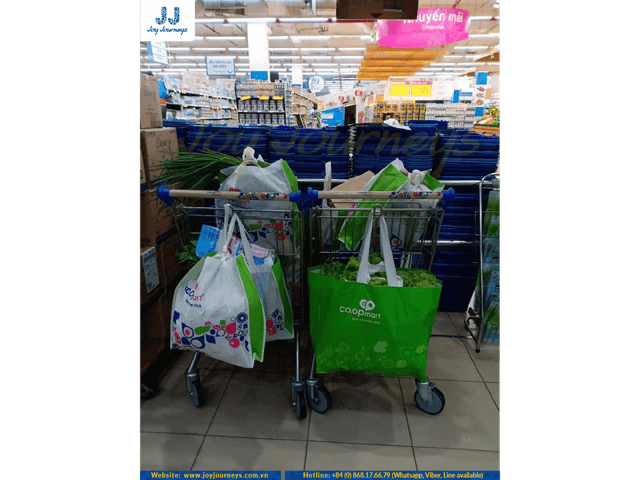
Vietnam Packing List and eSIM in Vietnam
When preparing for your journey to Vietnam, a well-thought-out packing list can make your adventure more comfortable and enjoyable.
Vietnam Packing List
Vietnam’s diverse climate and regions necessitate strategic packing, considering both the season and specific destinations.
- Clothing:
- Lightweight, breathable clothes are ideal, especially during the hot and humid seasons.
- Remember to pack some layers, including a light jacket or sweater for cooler evenings, especially if you’re traveling to the northern regions in winter.
- Footwear:
- Comfortable walking shoes for exploring cities and trekking shoes for any hiking adventures.
- Sandals for warmer days and beach visits.
- Weather-specific Items:
- Rain jacket or poncho, as Vietnam can experience sudden tropical downpours.
- Sunscreen, a hat, and sunglasses for protection against the strong sun.
- Personal Essentials:
- Travel-sized toiletries, including insect repellent.
- A travel adapter to ensure your electronic devices stay charged.
- Health and Safety:
- Necessary medications and a small first aid kit.
- Copies of important documents, such as your passport and travel insurance details.
- Technology and Gadgets:
- Camera for capturing the stunning landscapes and vibrant culture.
- Portable charger to keep your devices powered on the go.
- Cultural Considerations:
- Modest clothing for visits to temples and religious sites.
- A reusable water bottle to stay hydrated while minimizing environmental impact.
Remember, your packing list may vary based on the season and the specific regions you plan to visit. It’s always a good idea to check the weather forecast for your travel dates and research the climate of different areas within Vietnam.
eSIM in Vietnam
Staying connected during your Vietnam adventure is essential, and using an eSIM can be a convenient option.
Vietnam has several reputable mobile carriers, including Viettel and Vinaphone, offering eSIM services. Here’s what you need to know:
- What is an eSIM:
- An embedded SIM card that eliminates the need for a physical SIM.
- Compatible with eSIM-enabled devices, providing seamless connectivity.
- Getting an eSIM in Vietnam:
- Purchase an eSIM plan from local carriers like Viettel or Vinaphone.
- Follow the carrier’s instructions to activate the eSIM on your device.
- Advantages of eSIM:
- Convenience: No need to worry about losing or swapping physical SIM cards.
- Flexibility: Easily switch between carriers or plans without changing physical cards.
- Accessibility: Purchase and activate eSIM plans at local carrier stores or online.
- Using eSIM in Vietnam:
- Enjoy reliable and high-speed data connectivity throughout your travels.
- Make local calls and stay connected with friends and family effortlessly.
Conclusion
In conclusion, Vietnam, a mesmerizing destination, lures travelers worldwide. Ensuring a memorable and secure journey entails obtaining essential visas and travel insurance, staying vigilant against common scams and theft, respecting local customs, and supporting environmental conservation efforts. By adhering to these vital precautions, visitors can relish the beauty of Vietnam without compromising their well-being.


Related Posts
Saigon’s “Flower Market Replica”: Where To Find Them
Ho Chi Minh City’s floral charm is not limited to its bustling wholesale markets. Imagine wandering through a place where vibrant petals, fragrant blooms, and the spirit of traditional Vietnamese markets come alive—without the overwhelming crowds. A flower market replica captures that magic, blending the beauty of fresh flowers with the charm of a curated, […]
Is it Safe to Travel to Vietnam Right Now? A Complete 2025 Guide
Vietnam has emerged as one of Southeast Asia’s most captivating destinations, drawing millions of visitors annually with its rich culture, stunning landscapes, and incredible cuisine. However, many travelers still ask: Is it safe to travel to Vietnam right now? This comprehensive guide provides you with everything you need to know about Vietnam travel safety in […]
Ho Chi Minh Cu Chi Tunnels Tour: The Ultimate Guide
The Cu Chi Tunnels stand as one of Vietnam’s most remarkable historical sites, offering visitors a profound glimpse into the ingenuity and resilience displayed during the Vietnam War. For travelers, a Ho Chi Minh Cu Chi tunnels tour represents an essential experience that combines education, adventure, and deep cultural understanding. This comprehensive guide will help […]